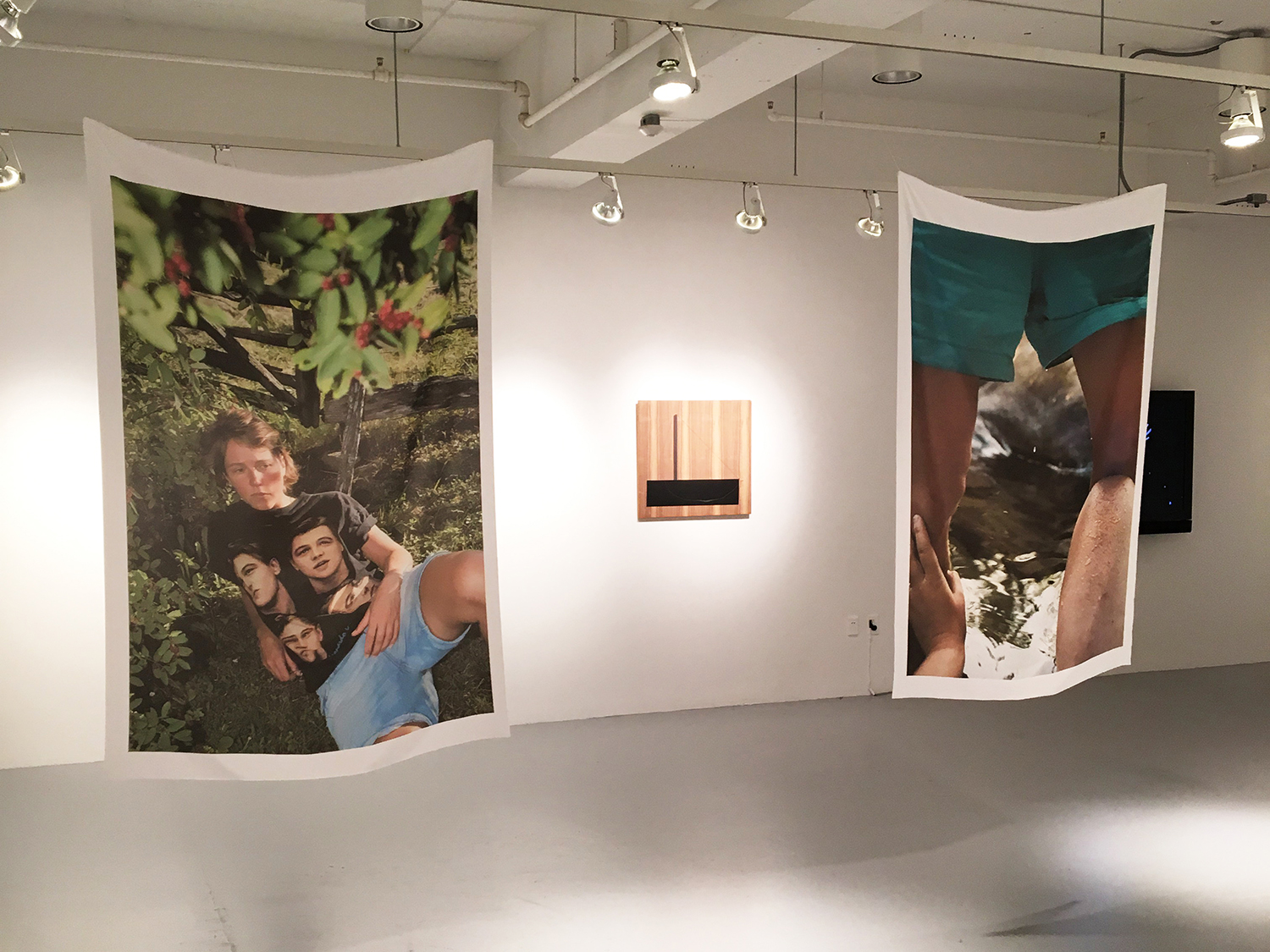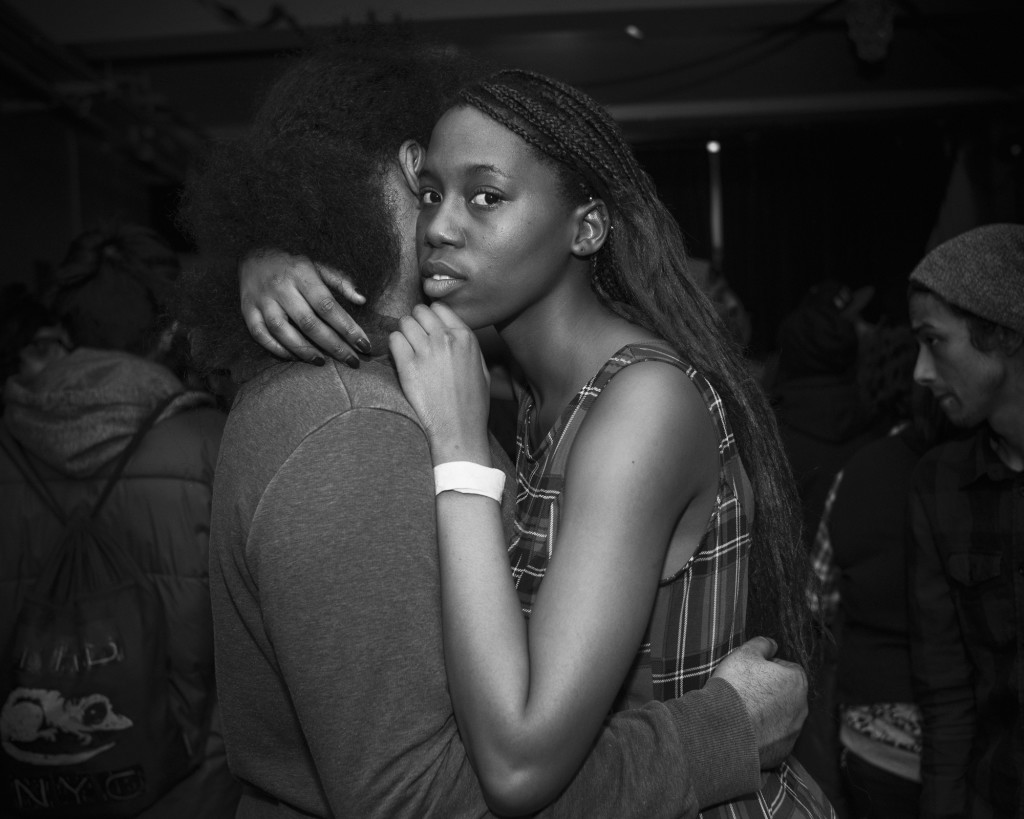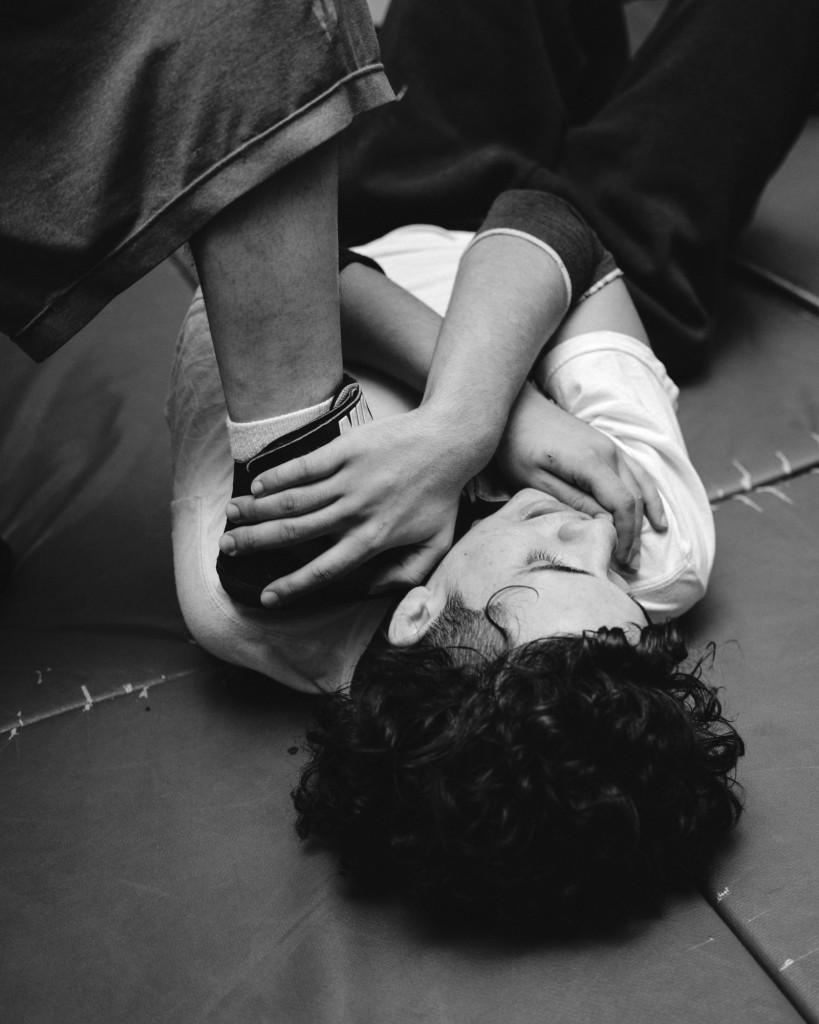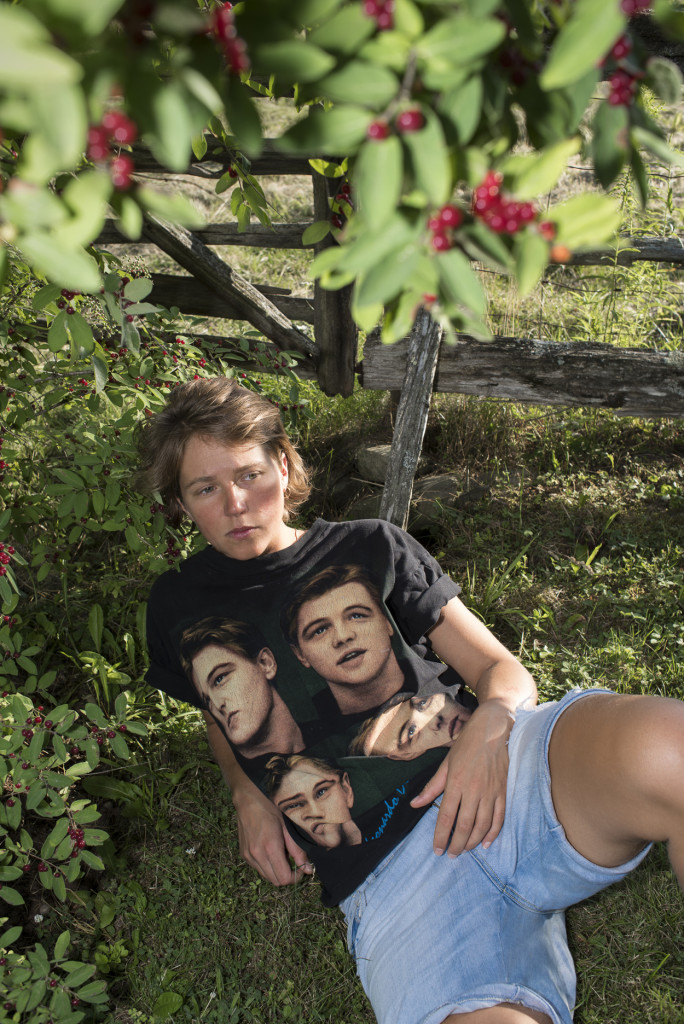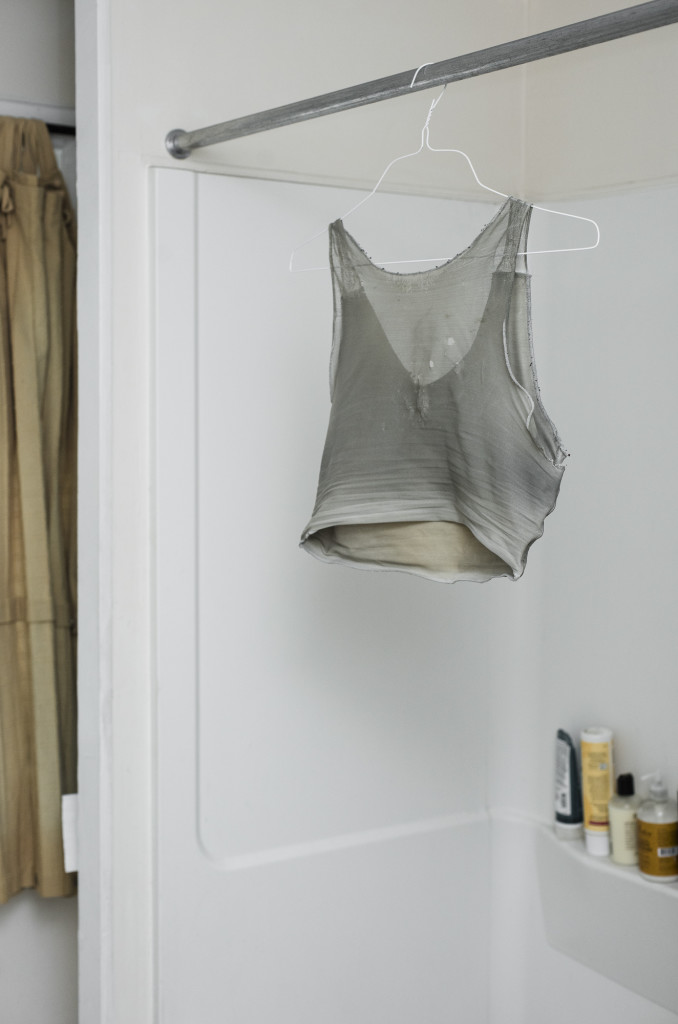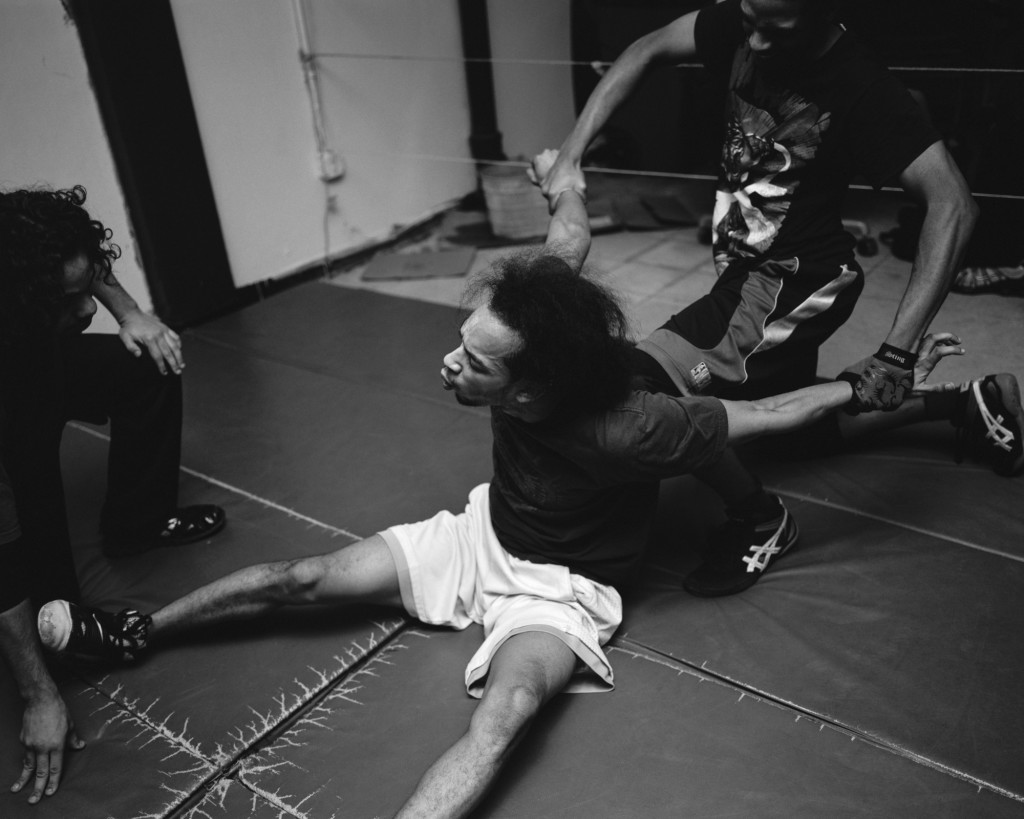Interview with Elle Pérez
Communities on the outskirts of society are at the heart of Elle Pérez’s work. We were able to talk with Elle Pérez over Skype while they were on the West Coast on assignment for The California Sunday Magazine.
Groana Melendez
I saw your wrestling project Raw. Did that all happen at Yale? What were you working on then? What are you working on now?
Elle Pérez
The wrestling work began while I was in graduate school at Yale, but it was made in the Bronx. I traveled back and forth a lot between CT and NY, multiple times a week sometimes while working on that project. Part of why I went to Yale was because of its proximity to the Bronx —I could be very close to home, but also have the critical distance to figure out what I wanted to do there.
It felt really good to be able to photograph at home after having traveled for a while and being based out of Baltimore. The punk shows that I grew up going to were still happening while I was at Yale, so whenever I didn’t know what to do with myself I would go back to that original point of inspiration.
The new pictures I’m working on as of now focus on desire, concealment, and seeing.
Martha Naranjo Sandoval
Could you tell us more about your work?
Elle
The overarching theme of my work is a celebration of the possibilities inherent to marginal spaces and identities. The subjects I’ve explored have ranged from people who identify as living between genders, entertainment wrestling, Puerto Rico, and underground nightlife.
Lately, I’ve started showing all of my photographs of different subjects together because they all feel part of the same experience. At one time I felt like I needed to compartmentalize them because it’s conventional to show photography in series. But more and more the idea of the project is falling away. All of these things are part of one life. Now I’m thinking of them as ‘just’ my pictures at this point, letting the parameters reveal themselves through work rather than pre-existing categories.
I just put a small selection of the new pictures up on my website. I’m printing on silk. The pictures hang in space, and they breathe when you walk by. They do all these things that a picture on the wall doesn’t necessarily do, like have a different opacity depending on the time of day. I don’t really know enough about these new pictures yet because I just started them this summer. There were two pictures last year that just appeared out of nowhere, totally different from what I’d been doing. The first one was a portrait of my friend Mishka. The second one was the picture of my binder hanging up to dry. Like little blips on a radar. Then nothing for almost a year. And it was a rough year, my first after grad school. I didn’t make many pictures that were successful. I felt like I had failed myself. Then, this summer, I intuitively started making a number of new pictures in color riffing off of similar themes. All of this new work coming out of what felt like nowhere. So that makes me feel a little bit better about my post-grad school blues.
Groana
There is hope. There is light.
Elle
Oh! There is definitely a light at the end of the post-grad school blues. When I started making work I cared about again I was like, “Oh! I’m not scarred forever!” It’s like, “No, you’re not. You just needed to recover.”
Groana
So, that’s what’s happening.
Elle
That is what’s happening. People told me that it takes time to feel like yourself again. But it just goes back to patience, of having to be like “Oh. I guess I have to actually wait for myself to recover, and heal, and rest.” I felt like, “what do you mean I can’t just run out of the gate right now? No? Oh.”
Groana
How has Yale it affected your relationship with photography?
Elle
Honestly, it really changed the fundamental nature of my relationship to photography. I had a really hard time in graduate school, at points traumatic. Graduate school is a two-year crisis you induce in your life by going to school.
As I move further away from it I’ve become grateful for its difficulty. Yale does what it does to people’s work — improves it so much — because it is so, extremely, difficult. You are asked to really hold up and examine yourself, your relationship to art, and the commitment you are making to this life. You get pushed. Over, and over, and over. By critics, by your peers, by the symptoms of systems of power and oppression endemic to a university like Yale. There has been nothing that I’ve ever experienced in my life that has deepened my relationship with photography and other people like my time at Yale did.
I met my people there. I learned some of the hardest truths about myself there. The trauma of Yale, it was worth it for everything that I gained from experiencing it. If had to do it again to keep all the things I learned, I would. But I’m glad I don’t. Ha!
What helped me process all the lessons of graduate school was starting to teach at Williams, and having to really parse all of the lessons that I’d just learned. I had to figure out how to mine them make them useful to students. It felt like my 3rd year of grad school.
Groana
That’s amazing.
Elle
It was so good.
Groana
How do you feel after grad school and after your first year of teaching?
Elle
I’m starting to feel clarity — that feels good. Another thing that has contributed to both of those things has been my involvement with Skowhegan. I was lucky enough to find myself there right after graduation from my MFA when I was still really emotionally drained. I got to go there and to make a new community for myself.
Skowhegan is designed to bring together people who have a lot of very different experiences in the world. It’s been a blessing to be able to talk to them about what their experiences have been with either higher education or not higher education, different art scenes internationally, just the different options out there.
Going to Skowhegan made it possible for me to teach immediately after graduating. It created a space between where I was and where I was going. Having a new group of teachers to learn from was critical for helping me decide what to keep from graduate school and what to jettison. Something I didn’t realize before I got there was that Skowhegan is actually a school. It has a reputation as a residency, but the thing that makes Skowhegan so special is that it’s not just a retreat; It’s an invitation to learn.
One of the best things that Sarah Workneh, who runs the program and who is one of this generation’s visionary teachers, has said about it is “Skowhegan is a school because we are here to learn.” I heard her say that this year in 2016 when I came back as a dean. I don’t remember if she said that when I was a participant, but one of my first questions I had as a staff member when I came back as the dean this year was, “Why are we a school? What makes us different than other residencies? What makes this experience such a critical juncture for so many people?”
I’m mulling over this question like it’s real hard. Then Sarah, in her opening speech answers that question by saying “Skowhegan’s a school because we’re here to learn,” The cartoon light bulb above my head went on. Ha. There, the learning takes place everywhere — you are learning in your studio, in your conversations, on the porch, in the lake, at visiting artist lectures, connecting with people from other countries you now cannot imagine your life without, having breakthroughs and breakdowns. The time is so short it requires a lot of generosity and energy from everyone involved. By week nine you’re a puddle of emotions and complexity. It feels like three years. Learning, there, happens in the most expanded sense.
When I was a participant in 2015, having artists like LaToya Ruby Frazier and Sarah Oppenheimer in my studio, talking to me about my work in this transitional moment, giving guidance and giving me feedback — that was huge.
One of the moments that was most influential was when Sarah Oppenheimer asked me what my engagement with the boundary of photography was, and what my relationship to convention was in photography with the work that I was making at the time.
Those two questions took me about a month to really hear them. They kept replaying in my mind. “Where is the boundary of photography? Why does that matter to me?” At the same time I was preparing my courses for the first time, so those questions then framed the way that I was looking at photo history and the way that I wanted to structure my syllabus, and thinking about what was crucial to convey for students.
Groana
That’s amazing.
Elle
It’s funny, too, the way Skowhegan has come into in my life. I had peripherally known about Skowhegan for years because I took my first real photography classes when I was in high school at the Education Alliance on the lower east side. The director at the time, Walter O’Neill, had been the fresco instructor at Skowhegan in the nineties. I first learned about it from him when I was a student there.
Groana
When I was growing up, there were no programs for photo. My junior year in high school, my school found out about a program at FIT, and that’s how I started getting into photo. With the kids I teach now, I’m just like, “You guys are so lucky because we didn’t have this. We didn’t have all these programs like for the arts,” and that’s just amazing.
Elle
Seriously! When I think about it, the Educational Alliance gave me so much. When Monica Bravo (the youth programs director) let me take a darkroom photo class for $75 —I paid her in one dollar bills — that moment has given me my whole life. I could never repay that debt. Even when Walter found out via Facebook that I was at Skowhegan as a participant, he wrote me a little card being like, “Here’s 20 bucks. Everybody needs beer money at Skowhegan.” I’m just like, “Wow! It’s been 10 years, and you’re still there.”
Now, I’m staff at Skowhegan, so it’s like just this funny, circular network that keeps going.
Groana
It was meant to be.
Elle
Oh, and the other funny time and space network moment I had recently has to do with this, too — it was meeting Keisha Scarville at Skowhegan. Keisha is an incredible photographer who used to teach the teen academy program at ICP. I remember being in high school and desperately wanting to get into Keisha’s class because all of my friends were in that class. Her students were people like Yael Malka, Paolo Morales, and Suzanna Zak; all who are now artists. Which I think is such a testament to the power of her teaching, and also the power of these programs when they come into your life at that time. When we met I felt like I was meeting a celebrity. But I remember that program was one of the few things that was available around 2006 when I was in high school.
Groana
Yes. I want to know more about that, how you went straight from grad school into teaching and — Also, you used to teach kids the differences with that and what role it plays in your practice.
Elle
I love teaching because I love people. I love talking about art, and I love facilitating community, I love making things accessible to people. It gives me ten times more than what I give. It’s something I hope to do for the rest of my life.
The difference between teaching and going to school was that I couldn’t ignore the work that I didn’t like. All of a sudden I had to contend with all of these artists that, in school, I had the luxury of saying, “I don’t like that work. I’m not going to learn about it,” or, “I’m not really going to engage with it,” or, “I don’t have to look at Richard Prince. I don’t have to think about Richard Prince.” Now, I have to know, because I have students asking, why was Spiritual America by Richard Prince so important in the history of photography? I actually have to have an answer for that. I had to go do the research and understand it. I really had to understand the motivations behind that work, the ways that it broke a boundary, the way that it played with convention and pushed past it into new territory.
At the end of my first year of teaching I had such a new and deep understanding of my own work and the ways in which I needed my work to change, the ways in which I should be looking for growth in my own work, the way I was or wasn’t considering the boundary of photography or the conventions, what was I taking for granted in my own work. I didn’t expect that.
Groana
That sounds beautiful. Now, I’m inspired to teach all over again.
Elle
Yeah! Then there’s also the relationship that I have with my students that forces me to be the best version of myself, the most articulate version of myself, the most challenged version of myself. That gets brought out by the relationship that I have with my students at Williams, who are amazing. They have taught me a lot about discipline. They’re so intelligent — like, “I’m 18 and I have an encyclopedic knowledge of artists,” and i’m like, “Damn, I’ve got to do better!”
Groana
That’s amazing. That’s good though. That sounds fun.
Elle
It also makes me think about the qualities that I model in the classroom and what signaling my various identities can mean for/to my students. One thing that brought that up for me was attending Liliana Porter’s lecture this summer at Skowhegan. I realized that she speaks english with the same heavy spanish accent that my grandmother does. And then I realized that it was the first time I’d ever heard that kind of accent from someone who was simultaneously being celebrated and respected as a leader in what could be called a mainstream art institution.
Martha
What’s your relationship to Spanish? Do you speak Spanish?
Elle
It’s shameful. [Laughs] I have a fluent ear. I can speak Spanish under duress.
In Puerto Rico, when I’m by myself and I really need to do it, I can do it. But speaking to my friends who are fluent in Spanish… It’s some shame thing that I’m trying to work through. My parents are both fluent Spanish speakers, as is my entire family, with the exception of my sister, myself, and my cousins who are my age.
We weren’t taught out of a desire to make us fluent English speakers and to not give us accents. I have a lot of shame around not being fluent in Spanish.
Martha
It doesn’t have to be shameful. Or do you think it should be a bigger part of your life?
Elle
Yeah. I do. It’s been hard because my shame is illogical. Because if it was logical, I would be able to work through it. I’ve been trying to teach myself Spanish for a number of years.
Martha
I mainly ask you this because I noticed when I moved here the difference in what gender means in both Spanish and English languages. In Spanish every word is gendered. Things are either male or female. Even a table [la mesa] is a female thing, and a stool [el banco] is a male thing. There’s no going away from gender.
But in English, that you can use “them” because that’s neutral. “Ellos y ellas” is gendered. I think that just speaking Spanish, you have this relationship to the binary of gender that is easier to avoid in English. But I learned that everything is either masculine or feminine. I was wondering what were your thoughts on that.
Elle
Whenever I go back to Puerto Rico, my name becomes activated in a really funny way. When I was 13, I was just so frustrated that people couldn’t pronounce my real name that I changed it to Elle. (Elle sounds like “Él”, “Him” in Spanish.)
I wasn’t really thinking about it at the time as something that would fuck with gender. Then whenever I go back to Puerto Rico, my name becomes really funny because people are like, “What is your name?” Then depending on their relationship to English, they either accept it or they don’t.
Martha
That’s in Spanish and in French, it’s the other way around. (“Elle” means “She” in French.)
Elle
Exactly, so it’s always been this funny, gender queer thing that I’ve embraced. But I also don’t feel like I’m at a point in my Spanish where I can be intellectual about gender yet. I haven’t had to negotiate my queer identity in Spanish yet.
Martha
I think it’s not even easy… I don’t think that Spanish even allows for that to happen. There’s not a word that allows going out the binary. Moving from Mexico to New York, all my ideas about gender just broke apart. There’s this thing about Mexico where you not only have to have a gender role, but even gender is not what you think it is. I had to negotiate with my ideas. Now living in New York and going back to Mexico City, it’s hard for me to even explain to people, smart people, that is not a conversation there, you know? I think it has to do with the language a lot because language is not permissive of not understanding gender as a binary.
Elle
That’s super interesting to hear. I feel like, honestly, with my family in Puerto Rico, I’m already such a weirdo that they just are like, “Whatever.” So in some ways, that just gives me this free pass where I don’t have to explain myself.
Groana
That’s what you can get away with by being an artist. You could just be like, “I’m an artist…” That’s what we’re here for.
Elle
Exactly. I have a particular relationship to ambiguity due to the racial ambiguity of being Puerto Rican and my gender ambiguity. I also think that ambiguity and illegibility, in a broader sense, can be a space of progress, and learning. Ambiguity can be a dangerous thing, for sure, too. At this point in my life, the only thing that I can do is embrace ambiguity, because it’s just the hand that I’ve been dealt.
Groana
You mentioned that as a kid of the diaspora your family was like, “I didn’t come here to make you an artist, for you to be an artist.” How do your parents feel about it now?
Elle
Once I got a job, it was okay. I think when I was a lot younger, they were just concerned about things that parents should be concerned about, which was like, “Are you going to be able to support yourself? Um, is this going to be a good idea like for you to chase down?” Just, “Is it a phase?” I think those things are fair questions.
Groana
Are your parents still in the Bronx?
Elle
Yes, they’re still in the Bronx. My parents were both born there and have also spent portions of their lives living in Puerto Rico. My grandparents were the generation that made the jump.
Groana
Are you living in the Bronx?
Elle
I just spent a year in Massachusetts, but right now, I’m commuting between the two to teach. I spend half the week in each place. Everything that’s going on with the Bronx has hit this fever pitch. I’m realizing that the vacation is over and I really can’t stay away that much longer.
Groana
You mean with the gentrification issues or—
Elle
Yeah, everything that’s going on with Mott Haven, and how things happening now in the Bronx are effecting my own family. All of those things are just saying, “All right. It’s time to really come home and do some work here.”
Groana
That’s interesting — side note. I’m trying to buy in Mott Haven. It’s impossible at the moment.
Elle
I bet it’s impossible.
Groana
Because I was just having a conversation with Mike Kamber from the BDC (Bronx Documentary Center), and he was saying that it’s not that residents don’t want new things to come into the neighborhoods, right?
Elle
Right.
Groana
That’s fair. He sees a solution being people our age, people like us moving back to our neighborhoods, being part of our neighborhoods instead of what’s been happening where we just leave. You grow up with this mentality that this is the last place you want to be in.
Elle
I was just talking to someone about this actually! I was just talking to a friend about the experience of growing up in New York and being from the Bronx. And then going to art school and having to negotiate that and figuring out how to authentically be yourself. I was taught to distance myself from the Bronx was to be successful. You had your Bronx self; you had your art self. Assimilation is about survival. The tough thing is that resisting assimilation is about survival, too. That creates a definite tension.
It’s been a really interesting experience to now be trying to bring all those parts of myself together.
Groana
I’m excited to see where that leads you. I want to ask you more about the whole thing that’s happening in the Bronx.
Elle
I don’t even know that much, which is a problem. The same friends who threw punk shows also used to throw parties from loosely 2007 to 2009, at the Bruckner Bar & Grill which is now the Mott Haven Bar & Grill. Even then, we were having conversations about gentrification.
Things were starting to happen in Mott Haven then; people were like
“Oh, no, here it comes.” There were think pieces already about how the Bronx was going to be the new Williamsburg — because at that point Williamsburg was still the conversation! People were trying to rebrand the area “SoBro.” That was happening then and now, almost a decade later, here we are again. A lot is going on. There’s a coffee shop that just opened up called Filtered that is being backed by the same developer, Somerset Partners, who tried renaming the area “the Piano district.” They placed the coffee shop right where it makes a triangle between some of the places artists — Bronx artists — Black and Latino artists — have been living or hanging out for a long time. Decades. The hashtag for the coffee shop before it opened was the Bronx is Brewing (“The Bronx is Burning”) before activists shut that down. People from the Bronx — my parents’ generation and my grandparents’ generation — have so much pain around that moment in history. And they were rebranding that pain as a hashtag. More pain.
Martha
I have a very particular relationship to gentrification because I’m an immigrant and I live in a Puerto Rican building. Sometimes I get things from my neighbors like “You’re gentrifying this place,” and I’m like, “Yeah, but I don’t belong anywhere in the city, I’m just moving in from somewhere else, so where am I supposed to exist in this place?”
Elle
I don’t know. My issue, in particular, is not with people moving here and it’s definitely not with immigration because that’s how my family got here.
My issue is with the speculation aspect of it all, the money-making scheme of displacement. The using of artists, from Swizz Beatz to local artists, to pump up the image of the area as a site of cultural production, and therefore value, so that they can make more money.
It doesn’t improve the community. And it doesn’t bringing in any resources more valuable than what’s already there. So to me, their game is not about community improvement. It’s about making money. The result of which is displacing an entire population and entire histories. And I’m thinking, can someone please have a longer view on this? While you’re making money in the short term, right now, on this neighborhood, you are also bleeding all of the culture out of this city.
Groana
Exactly.
Elle
My issue is with greed rather than people moving to the Bronx. I actually love helping people find a place here and welcoming them here. I got that from my parents. Our home growing up was often open to people who were moving here or temporarily needed a place to stay, family or otherwise.
Even some friends from college. Just recently, a friend I was talking to was like, “Oh no! My sublet just fell through!” and I was like, “Honestly If you need a place, you can probably stay with my parents. They love artists; they’ll love you and, you know, you could probably stay the time that you need to stay with them.” I called up my mom and told her the deal and she was like, “Oh yeah. She needs a room? We’ve got her.”
Groana
That’s my dream. I want to make a home like that.
Elle
To me, that’s what a New Yorker does; they have that kind of generosity. Sometimes people are amazed at that kindness. I just see it as helping people. I see it as necessary.
